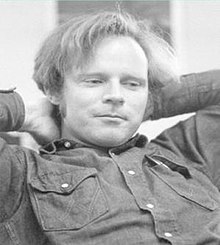Robert W. Floyd | |
|---|---|
 Floyd c. 1970s | |
| Born | Robert Willoughby Floyd June 8, 1936 New York City, New York, U.S. |
| Died | September 25, 2001 (aged 65) Stanford, California, U.S. |
| Education | University of Chicago (BA, BA) |
| Known for | Floyd–Warshall algorithm Floyd–Steinberg dithering Floyd's cycle-finding algorithm Floyd's triangle ALGOL |
| Spouse(s) | Jana M. Mason; Christiane Floyd (née Riedl) |
| Children | 4 |
| Awards | Turing Award (1978) Computer Pioneer Award (1991) |
| Scientific career | |
| Fields | Computer science |
| Institutions | Illinois Institute of Technology Carnegie Mellon University Stanford University |
| Doctoral students | |
Robert W. Floyd[1] (born Robert Willoughby Floyd; June 8, 1936 – September 25, 2001) was an American computer scientist. His contributions include the design of the Floyd–Warshall algorithm (independently of Stephen Warshall), which efficiently finds all shortest paths in a graph and his work on parsing; Floyd's cycle-finding algorithm for detecting cycles in a sequence was attributed to him as well. In one isolated paper he introduced the important concept of error diffusion for rendering images, also called Floyd–Steinberg dithering (though he distinguished dithering from diffusion). He pioneered in the field of program verification using logical assertions with the 1967 paper Assigning Meanings to Programs. This was a contribution to what later became Hoare logic. Floyd received the Turing Award in 1978.
- ^ Floyd had his middle name "Willoughby" legally changed to "W" but deemed abbreviating it as "W." valid (Knuth 2003) (DOD form DD 48-1, personal papers, Stanford University Archive catalog SC 625 box 4)